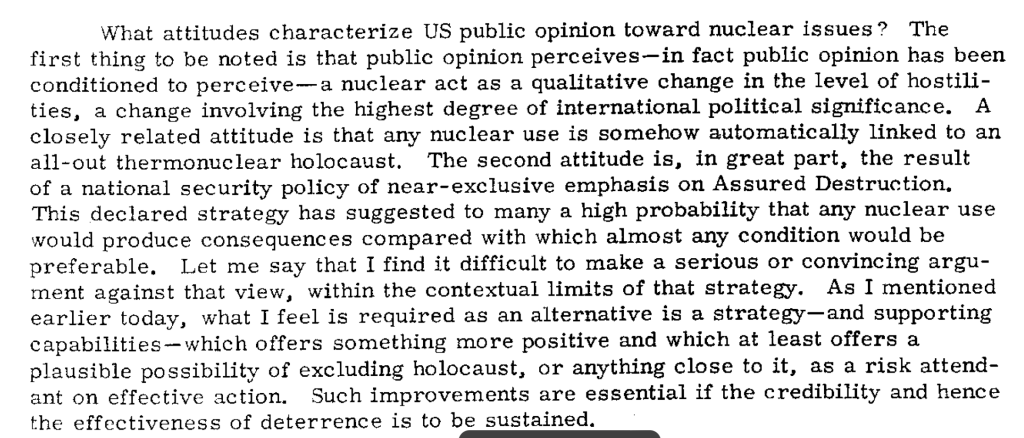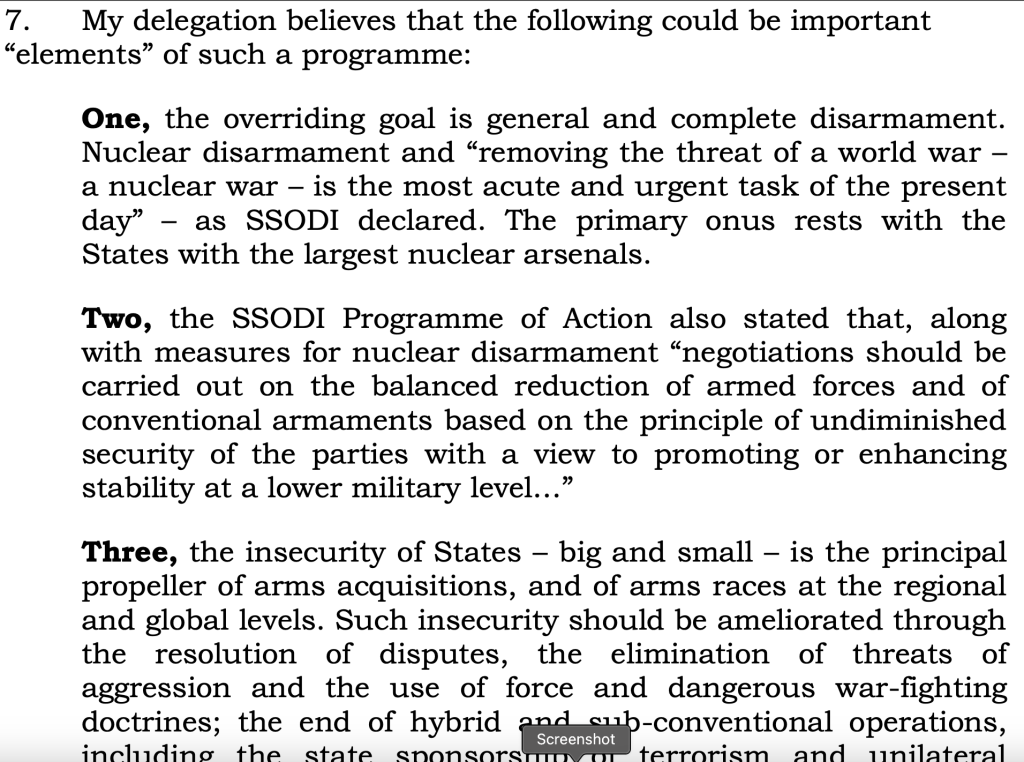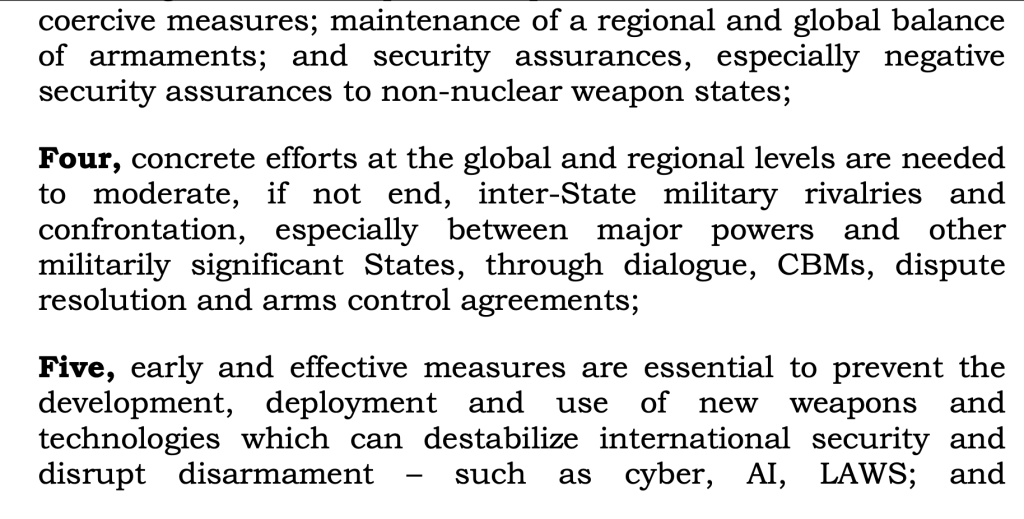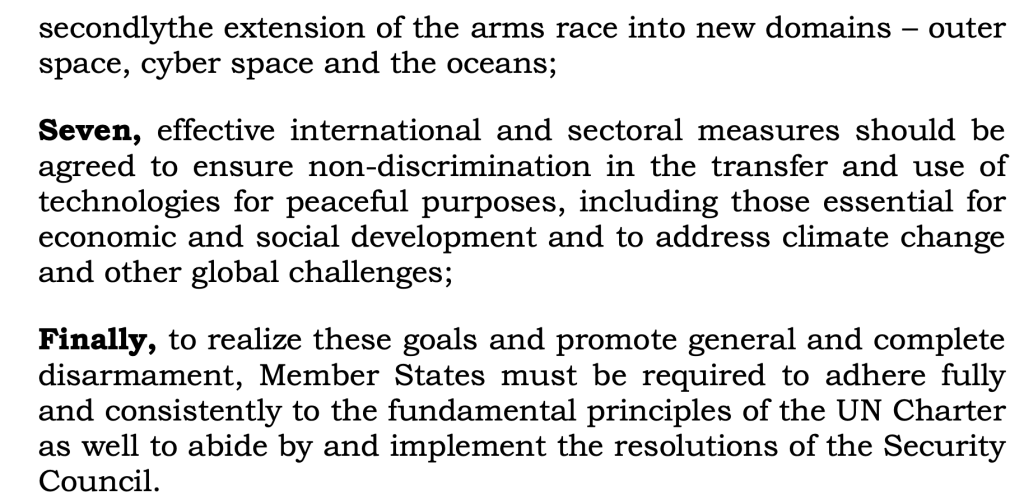To ensure its ability to deter both Russia and the growing Chinese nuclear threat, the U.S. will need more than the bare minimum of nuclear modernization. President Biden’s 2022 NPR described the problem but proposed no recommendations to restore or maintain nuclear deterrence.
- Consider procuring more modernized nuclear systems (such as the Sentinel missile or LRSO) than currently planned.
- Improve the ability of the U.S. to utilize the triad’s upload capacity in case of a crisis.
- Review what capabilities in addition to the SLCM-N (for example, nonstrategic weapons or new warhead designs) are needed to deter the unique Chinese threat.
Category Archives: Uncategorized
Project 2025 on Arms Control
Here’s what Project 2025 has to say about arms control:
Correctly orient arms control. The U.S. should agree to arms control agreements only if they help to advance the interests of the U.S. and its allies.
- Reject proposals for nuclear disarmament that are contrary to the goal of bolstering deterrence.
- Pursue arms control as a way to secure the national security interests of the U.S. and its allies rather than as an end in itself.
- Prepare to compete in order to secure U.S. interests should arms control efforts continue to fail.
Verma on U.S.-India Nuclear Agreement
He recounted some history the other day:
It was President Clinton who – once and for all delinked U.S.-India and U.S. – Pakistan policy.
Indo-Pak would be set aside in favor of a robust set of policy initiatives that, as I noted, were not only significant but they were creative, too.
There was no more creative, and – yes – difficult policy decision than to construct the U.S.-India civil nuclear deal.
This was a landmark initiative to deliver safe and reliable nuclear energy to India, while simultaneously bringing India into the international atomic energy compliance and safety regimes.
It took a bold change in thinking in India, and it took leadership here at home, with President Bush and so many others and then Senator Biden from his perch on the Senate Foreign Relations Committee, to lead the efforts in D.C. and capitals around the world.
As has been noted by scholars here at Hudson and in think tanks across D.C. and Delhi, the deal was critical as it showed that our countries were willing to bend with history and take extraordinary steps that would have lasting effects.
Project 2025 on China and Nuclear Weapons
From the document:
Beijing presents a challenge to American interests across the domains of national power, but the military threat that it poses is especially acute and significant. China is undertaking a historic military buildup that includes increasing capability for power projection not only in its own region, but also far beyond as well as a dramatic expansion of its nuclear forces that could result in a nuclear force that matches or exceeds America’s own nuclear arsenal.
U.S. defense strategy must identify China unequivocally as the top priority for U.S. defense planning while modernizing and expanding the U.S. nuclear arsenal and sustaining an efficient and effective counterterrorism enterprise.
China is pursuing a strategic breakout of its nuclear forces, significantly shifting the nuclear balance and forcing the U.S. to learn how to deter two nuclear peer competitors (China and Russia) simultaneously for the first time in its history.
China and Russia, in addition to their vast and growing ballistic missile inventories, are deploying new hypersonic glide vehicles and investing in new ground-launched, air-launched, and sea-launched cruise missiles that uniquely challenge the United States in different domains.
Project 2025 and Missile Defense
Here’s what Project 2025 has to say about missile defense:
Despite its deterrence and damage-limitation benefits, opponents argue incorrectly that U.S. missile defense is destabilizing because it threatens Russian and Chinese second- strike capabilities.
- Reject claims made by the Left that missile defense is destabilizing while acknowledging that Russia and China are developing their own advanced missile defense systems.
- Commit to keeping homeland missile defense off the table in any arms control negotiations with Russia and China.
Strengthen homeland ballistic missile defense. The United States currently deploys 44 Ground-Based Interceptors (GBIs) as part of its Ground-based Midcourse Defense (GMD) system to defend the homeland against North Korea, but as North Korea improves its missile program, this system is at risk of falling behind the threat.
- Buy at least 64 of the Next Generation Interceptor (NGI), which is more advanced than the GBI, for an eventual uniform fleet of interceptors. The Biden Administration currently plans to buy only 20.
- Consider additional steps to strengthen the GMD system such as a layered missile defense or a third interceptor site on the East Coast.
Increase the development of regional missile defense. As the Ukraine conflict amply demonstrates, U.S. regional missile defense capabilities are very limited. The United States has been unable to supply our partners reliably with any capabilities, and the number and types of regional missile defense platforms are less than the U.S. needs for its own defense. The U.S. should prioritize procurement of more regional defense systems such as Theater High Altitude Area Defense (THAAD), Standard Missile-3, and Patriot missiles.
Change U.S. missile defense policy. Historically, the U.S. has chosen to rely solely on deterrence to address the Russian and Chinese ballistic missile threat to the homeland and to use homeland missile defense only against rogue nations.
- Abandon the existing policy of not defending the homeland against Russian and Chinese ballistic missiles and focus on how to improve defense as the Russian and Chinese missile threats increase at an unprecedented rate.
- Invest in future advanced missile defense technologies like directed energy or space-based missile defense that could defend against more numerous missile threats.
Missile defense is a critical component of the U.S. national security architecture. It can help to deter attack by instilling doubt that an attack will work as intended, take adversary “cheap shots” off the table, and limit the perceived value of mis- siles as tools of coercion. It also allows space for diplomacy during a crisis and can protect U.S. and allied forces, critical assets, and populations if deterrence fails. Adversaries are relying increasingly on missiles to achieve their aims.
Change U.S. missile defense policy. Historically, the U.S. has chosen to rely solely on deterrence to address the Russian and Chinese ballistic missile threat to the homeland and to use homeland missile defense only against rogue nations.
- Abandon the existing policy of not defending the homeland against Russian and Chinese ballistic missiles and focus on how to improve defense as the Russian and Chinese missile threats increase at an unprecedented rate.
- Invest in future advanced missile defense technologies like directed energy or space-based missile defense that could defend against more numerous missile threats.
Pakistan and CD
IAF on Brahmos
This news report has details of the Indian Air Force’s explanation concerning the 2022 Brahmos incident:
In a statement submitted to the Delhi high court during a case, the IAF revealed that a court of inquiry to probe the incident found that “combat connectors of the BrahMos missile remained connected to the junction box” during a routine inspection, leading to the unintended launch. The junction box is a critical component that transmits firing signals to the missile.
The probe further highlighted the gravity of the situation. The combat crew were aware that the combat connectors were still attached to the junction box, but failed to intervene. Consequently, the mobile autonomous launcher commander launched the missile, posing a potential threat to airborne aircraft.
DRDO on Agni V MIRV Test
Bit late to the party, but here’s the DRDO press release about the Agni V MIRV test:
DRDO successfully conducts Mission Divyastra
Indigenously developed Agni-5 missile makes maiden flight with MIRV
Posted On: 11 MAR 2024 8:02PM by PIB Delhi
Defence Research and Development Organisation (DRDO) conducted first successful flight test of indigenously developed Agni-5 missile with Multiple Independently Targetable Re-Entry Vehicle ( MIRV) technology. The flight test named Mission Divyastra was carried out from Dr APJ Abdul Kalam Island in Odisha. Various Telemetry and radar stations tracked and monitored multiple re-entry vehicles. The Mission accomplished the designed parameters.
Prime Minister Shri Narendra Modi lauded the efforts of the DRDO scientists who participated in the conduct of the complex Mission. In a post on social media platform X He said, “ Proud of our DRDO scientists for Mission Divyastra, the first flight test of indigenously developed Agni-5 missile with Multiple Independently Targetable Re-entry Vehicle (MIRV) technology.”
Raksha Mantri Shri Rajnath Singh has also congratulated the scientists and the entire team, terming it as an exceptional success.
U.S. Public Opinion on Nuclear Weapons, 1960s Edition
The proceedings from that TNW workshop about which I’ve previously posted has this discussion of U.S. public opinion on nuclear weapons use:

Switzerland on TPNW
Here’s a statement from the Swiss Federal Council on the TPNW:
On the basis of a new comprehensive reassessment, the Federal Council decided at its meeting on 27 March 2024, that there is currently no reason to change its position on the Treaty on the Prohibition of Nuclear Weapons (TPNW), which entered into force in 2021. It has therefore reaffirmed the conclusion it reached in 2018 and 2019 and has decided that Switzerland will not join the TPNW for the time being. The Federal Council’s conclusion is based both on the assessment made in 2018–19 and recent security policy developments in Europe and globally. The Federal Council considers Switzerland’s commitment to a world without nuclear weapons, pursued within the framework of the Nuclear Non-Proliferation Treaty (NPT), to be a more effective approach.



